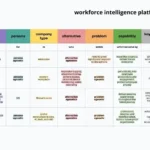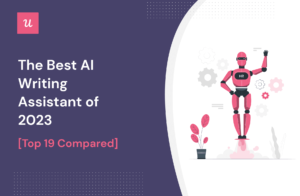Artificial Intelligence (AI) is transforming sales intelligence. Companies now use AI to gain insights and boost sales.
Sales teams need accurate data to make informed decisions. AI helps by analyzing huge amounts of data quickly. This technology identifies patterns and predicts trends, giving sales teams an edge. AI tools can also automate tasks, saving time and resources.
This lets salespeople focus on building relationships and closing deals. By integrating AI, businesses enhance their sales strategies and stay competitive. In this blog, we explore how leveraging AI can lead to better sales intelligence and improved performance. Discover the benefits and practical applications of AI in sales. Dive into the future of sales intelligence with AI.
Table of Contents
ToggleIntroduction To Ai In Sales
Artificial Intelligence (AI) is transforming how businesses operate. In sales, AI offers tools to enhance performance. Companies can now predict customer behavior, personalize offers, and automate tasks. This leads to increased efficiency and better results.
Why Ai Matters In Sales
AI helps sales teams understand customer needs. With AI, they can use data to make informed decisions. This improves the chances of closing deals. AI tools analyze customer data, identify patterns, and predict future actions.
AI also automates repetitive tasks. This allows sales teams to focus on building relationships. They spend less time on data entry and more time on selling. AI tools can handle tasks like lead scoring and follow-up emails.
In short, AI makes sales teams more efficient and effective. It provides insights and automates tasks, leading to better sales performance.
Historical Context
Sales practices have evolved over time. In the past, salespeople relied on their instincts and experience. They used basic tools like phone calls and handwritten notes. This method was time-consuming and often inaccurate.
With the advent of computers, sales teams began using spreadsheets and databases. These tools allowed for better organization and tracking. Yet, they still required manual input and analysis.
Today, AI offers a new level of sophistication. It leverages vast amounts of data to provide actionable insights. Sales teams can now predict customer behavior with greater accuracy. They can personalize their approach and increase their chances of success.
AI has transformed sales from an art to a science. It uses data to guide decisions, making the process more efficient and effective.
Benefits Of Ai In Sales
- Predict customer behavior
- Personalize offers and communications
- Automate repetitive tasks
- Improve lead scoring
- Enhance decision-making with data insights
In conclusion, AI plays a crucial role in modern sales. It offers tools to understand customers better, automate tasks, and improve performance. By leveraging AI, sales teams can achieve better results and drive growth.

Credit: draup.com
Benefits Of Ai-driven Sales Intelligence
In today’s competitive market, leveraging AI for sales intelligence offers many benefits. AI-driven sales intelligence tools help businesses understand their customers better. These tools provide valuable insights and forecast trends, enabling companies to make informed decisions.
Enhanced Customer Insights
AI tools analyze vast amounts of customer data. This includes purchase history, browsing behavior, and social media activity. By processing this data, AI provides detailed customer profiles. Sales teams can understand customer preferences and needs better.
With enhanced insights, companies can tailor their sales strategies. Personalized approaches increase customer satisfaction and loyalty. AI-driven insights lead to more effective marketing campaigns and sales pitches.
Predictive Analytics
Predictive analytics is a powerful feature of AI-driven sales intelligence. AI algorithms analyze historical data to predict future trends. This helps businesses anticipate customer needs and market changes.
For example, AI can forecast which products will be in demand. This allows companies to manage inventory better. Predictive analytics also helps in identifying potential leads. Sales teams can focus on high-potential prospects, increasing conversion rates.
Here is a table summarizing the benefits:
| Benefit | Description |
|---|---|
| Enhanced Customer Insights | Detailed understanding of customer preferences and behavior. |
| Predictive Analytics | Forecasting future trends and customer needs. |
In summary, AI-driven sales intelligence provides valuable insights and predictions. These tools help businesses make data-driven decisions. Companies can enhance customer satisfaction and improve sales performance.
Implementing Ai In Sales Strategies
AI is transforming sales. It helps identify opportunities and streamline processes. Implementing AI in sales strategies can enhance decision-making. It can also improve sales performance. Let’s explore how to leverage AI effectively.
Identifying Key Areas
Start by identifying key areas where AI can add value. Focus on tasks that are repetitive and time-consuming. These could include:
- Lead scoring
- Sales forecasting
- Customer segmentation
AI excels at analyzing large datasets. It can uncover patterns and insights that are hard to find manually. This helps in identifying the most promising leads and predicting sales trends.
Integration With Existing Systems
Successful AI implementation requires seamless integration with existing systems. This ensures data flows smoothly between platforms. Here are some steps to ensure a smooth integration:
- Assess your current tech stack
- Identify compatible AI tools
- Plan for data migration and integration
- Test the integration thoroughly
Integrating AI with CRM systems, for example, can provide a unified view of customer interactions. This helps sales teams make informed decisions and personalize their approach.
Consider using APIs to connect AI tools with your existing software. This allows for real-time data exchange. It also ensures that your AI solutions are always up-to-date. In addition to real-time data exchange, using APIs for AI integration also streamlines communication between different software systems. This can help in centralizing business notifications and alerts, ensuring that important information reaches the right people at the right time. By leveraging APIs, you can create a more efficient and connected ecosystem for your AI tools, maximizing their impact on your business operations.
Ai Tools For Sales Enhancement
Leveraging AI for sales enhancement can transform your business. AI tools help improve sales by providing better insights and automating tasks. They analyze data to predict trends and customer behavior. This leads to more accurate sales strategies and better decision-making. AI also personalizes customer interactions, making them more effective.
Popular Ai Platforms
Several AI platforms are popular for sales enhancement. Salesforce Einstein is a leading choice. It integrates AI to provide predictive analytics and insights. HubSpot offers AI-powered tools for marketing and sales. It helps automate tasks and improve lead scoring. Another option is Zoho CRM, which uses AI for sales forecasting and customer insights. Each of these platforms offers unique features to boost sales efficiency.
Selecting The Right Tools
Choosing the right AI tools is crucial. Start by identifying your business needs. Different tools offer various features. If you need better lead scoring, choose a tool that excels in that area. Consider the ease of integration with your current systems. Some tools are easier to implement and require less technical knowledge.
Also, look at the cost. Ensure the tool fits your budget. Evaluate the support and training offered by the provider. Good support can make a big difference. Lastly, read reviews and case studies. Learn from others’ experiences to make an informed decision.
Case Studies Of Ai Success
Artificial Intelligence (AI) is transforming sales intelligence. Many companies have achieved impressive results by integrating AI into their sales processes. These real-world case studies highlight the tangible benefits of AI in enhancing sales performance.
Company A: Increased Revenue
Company A implemented AI-driven analytics to understand customer behavior better. They identified patterns in purchasing habits. This allowed them to target their marketing efforts more effectively. As a result, their revenue increased by 15% within six months. The AI system provided insights into which products customers were likely to buy next. This enabled the sales team to focus their efforts on high-potential leads. The streamlined approach saved time and boosted sales.
Company B: Improved Customer Retention
Company B used AI to analyze customer feedback and behavior. They identified signs of customer dissatisfaction early. This proactive approach helped them address issues before customers churned. The AI system also suggested personalized offers to re-engage at-risk customers. This strategy led to a 20% improvement in customer retention rates. By keeping customers happy, Company B saw increased long-term value from their client base.

Credit: numly.io
Challenges In Ai Adoption
Adopting AI for better sales intelligence can bring significant benefits. Yet, businesses often face several challenges in this journey. Addressing these challenges is crucial for successful AI integration.
Data Privacy Concerns
Protecting customer data is a top priority. Companies must ensure that AI systems handle data securely. This includes following strict regulations and guidelines. Many businesses worry about data breaches. They fear losing customer trust. These concerns can slow down AI adoption. Effective measures and policies can help mitigate these risks.
Technical Barriers
Implementing AI technology requires skilled personnel. Not all companies have access to AI experts. This shortage can hinder AI deployment. Additionally, integrating AI with existing systems can be complex. It may require significant time and resources. Upgrading infrastructure to support AI is another challenge. Companies need to invest in new technologies and training. Overcoming these barriers is essential for leveraging AI effectively.
Future Trends In Ai For Sales
The future of AI in sales looks promising. As technology advances, AI’s role in sales intelligence will expand. Businesses will benefit from new tools and strategies. Understanding these trends can help companies stay ahead.
Emerging Technologies
AI continues to evolve. New technologies are emerging. Machine learning is becoming more sophisticated. This allows for better data analysis. Predictive analytics will improve. Sales teams can forecast outcomes more accurately. Natural language processing is also advancing. Chatbots and virtual assistants will become more effective.
Predictions For The Next Decade
The next decade will bring significant changes. AI will automate more tasks. Sales teams will focus on strategy. Customer insights will be deeper. Personalization will reach new levels. AI will analyze customer behavior in real-time. This will enhance the customer experience.
Voice recognition technology will improve. Sales reps can use voice commands to access data. Augmented reality may also play a role. Virtual product demonstrations could become common. These advancements will reshape the sales landscape.

Credit: www.youtube.com
How Can AI be Incorporated into Data-Driven Sales Strategies to Boost Revenue?
In 2025, datadriven sales strategies for 2025 can benefit from incorporating AI to boost revenue. AI can analyze customer data to predict buying behavior, personalize product recommendations, and automate sales processes. This can result in more effective targeting, increased efficiency, and ultimately higher sales and revenue.
Best Practices For Ai Integration
Integrating AI for better sales intelligence can transform your business. But to achieve success, you need to follow best practices. This ensures that AI tools work effectively and your team can use them to their full potential.
Training Your Team
Training your team is crucial for a smooth AI integration. Your team needs to understand how AI tools work. They should know how to use them daily. Here are some steps to ensure effective training:
- Conduct regular training sessions
- Provide hands-on workshops
- Offer online tutorials and resources
- Create a support system for quick help
Regular training sessions help team members learn new updates. Hands-on workshops provide practical experience. Online tutorials offer flexibility. A support system ensures quick problem-solving.
Continuous Improvement
AI tools need continuous improvement. This ensures they stay effective and useful. Here are some practices for maintaining AI systems:
- Regularly update AI algorithms
- Monitor system performance
- Gather feedback from users
- Analyze data to identify improvement areas
Updating algorithms keeps the AI system up-to-date. Monitoring performance helps spot issues early. User feedback offers insights into real-world use. Data analysis highlights areas needing improvement.
| Practice | Benefit |
|---|---|
| Regular updates | Keeps the system current |
| Performance monitoring | Detects issues early |
| User feedback | Provides practical insights |
| Data analysis | Identifies improvement areas |
Follow these best practices to integrate AI successfully. Train your team well. Continuously improve your AI systems. This ensures effective use of AI for better sales intelligence.
Frequently Asked Questions
How Can Ai Improve Sales Intelligence?
AI can analyze vast amounts of data quickly. It identifies patterns and trends. This helps sales teams make informed decisions and target the right customers.
What Are The Benefits Of Ai In Sales?
AI increases efficiency by automating tasks. It provides insights from data analysis. This helps in better targeting and personalization, leading to higher conversion rates.
How Does Ai Predict Customer Behavior?
AI uses machine learning algorithms. It analyzes past customer interactions and purchase history. This helps in predicting future behavior and preferences.
What Tools Use Ai For Sales Intelligence?
Many tools use AI for sales intelligence. Examples include Salesforce Einstein, HubSpot, and Zoho CRM. These tools help automate tasks and provide valuable insights.
Conclusion
Leveraging AI for better sales intelligence transforms how businesses operate. It provides valuable insights, aids decision-making, and enhances customer relationships. AI tools help identify trends and optimize sales strategies. Businesses can gain a competitive edge by adopting AI technologies. Sales teams perform more efficiently with AI support.
Companies see significant improvements in productivity and revenue. Embrace AI to stay ahead in the market. Start small, scale gradually, and witness the benefits. AI in sales is no longer optional. It’s essential for success in today’s competitive landscape.






